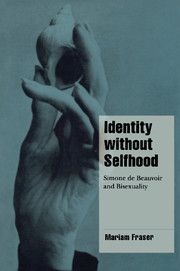4 - Preclusion
Published online by Cambridge University Press: 27 October 2009
Summary
At … moments of extreme exposure, the null response, far from declaring the question empty, returns to it and preserves it as a question. What cannot be effaced is the question itself: who am I?
Paul Ricoeur, ‘Narrative Identity’The analysis in chapter 3 illustrated that individuality, responsibility (taking responsibility for one's narrative identity) and continuity (being the ‘same’ throughout one's life) are central among the features which contribute to intelligible selfhood, which construct de Beauvoir as a coherent self. These are themes which I will take up again in this chapter, although here I will be concerned not only with those identities which are attributed to de Beauvoir – in particular, lesbian and heterosexual identities – but also with how it is that bisexuality is precluded from being a property of her self. Indeed, it is the relation between the ascription of heterosexuality or lesbianism to de Beauvoir and the preclusion of bisexuality – even though it is present in the biographical accounts of de Beauvoir's life and work (named as it is) – that is especially interesting.
The ascription of heterosexuality to de Beauvoir occurs in four main ways. In the first instance, in Francis and Gontier's, Crosland's and Moi's accounts, de Beauvoir is understood to have had no conscious ‘choice’ in her relationships with women and, hence, appears not to be personally responsible for them. The only stories that de Beauvoir is held responsible for (and the only ones which provide narrative closure) are stories of (usually) rewarding and reciprocal heterosexuality. This is the second way that de Beauvoir's same-sex relationships are precluded from the sexualnarrative- identity conferred on her. The third method of preclusion is found in Crosland's biography.
- Type
- Chapter
- Information
- Identity without SelfhoodSimone de Beauvoir and Bisexuality, pp. 79 - 101Publisher: Cambridge University PressPrint publication year: 1999



